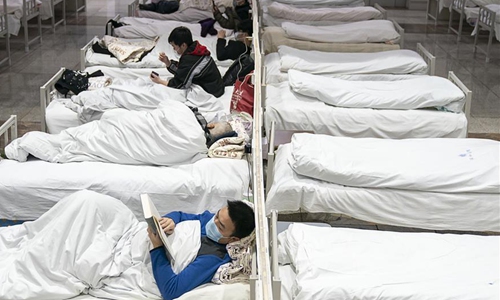
Patients infected with the novel coronavirus are seen at a makeshift hospital converted from an exhibition center in Wuhan, central China's Hubei Province, Feb. 5, 2020. The first makeshift hospital converted from an exhibition center in China's epidemic-hit Wuhan city began accepting patients Wednesday. The hospital can provide about 1,600 beds to infected patients. (Xinhua/Xiong Qi)
A World Health Organization (WHO) team of experts is scheduled to visit Wuhan on Saturday, as the medical system in the city has been updated.
It's seen as an opportune time for the team to monitor the situation in the epicenter of the current COVID-19 epidemic and track its origin, analysts said.
The number of discharged patients in Wuhan has been exceeding new confirmed cases and some hospitals already have empty beds, which means the strain on medical resources has eased compared to the early stages of the outbreak, said Chen Xi, an assistant professor at the School of Public Health at Yale University.
The expert team will collect wild animal samples in an attempt to track the origin of the novel coronavirus and conduct research to determine if there are still animal-to-human transmissions, Chen told the Global Times on Saturday.
Such work can only be done in Wuhan, where the outbreak started.
Chen also expected the team to visit and check the quarantine conditions in makeshift hospitals, which has attracted worldwide attention.
The global community is also highly concerned about the infection of medical staff, so they will collect first-hand information to see if the trend has been halted, said Chen.
More than 3,000 medical personnel have been infected with the coronavirus and at least 8 have died in the line of duty, including Li Wenliang from Wuhan Central Hospital, according to official data.
As a nucleic acid test is now the main method of confirming an infection case in accordance with the latest treatment guidebook, the team will ascertain whether cases excluded in compliance with the new guidelines are being quarantined in facilities with adequate prevention measures, he said.
Clinical observation is one criterion for confirming infection listed in the fifth version of the guidebook but has been deleted in the latest version.
The WHO-led team will also check the situation regarding post-traumatic stress disorder for local residents and medical personnel, Chen said.
More than 10 million residents in Wuhan have been ordered to stay at home and the whole city has been under lockdown for a month, which "causes unavoidable mental trauma," Chen added.
He also stressed that doctors and nurses have been working overtime under tremendous pressure, and the psychological aftermath of that strain requires further study.
Yang Zhanqiu, deputy director of the pathogen biology department at Wuhan University, told the Global Times Wuhan is an unavoidable stop in the itinerary of the WHO-led expert team. China attaches great importance to information transparency during the epidemic.
The expert team will learn about basic research on the virus, clinical treatment, and epidemic control in Wuhan and the other regions they previously visited. Such a tour will help introduce China’s experience to the world, which is of great importance to global control and prevention of the COVID-19.
The expert team visited Beijing, South China’s Guangdong, and Southwest China’s Sichuan provinces. They met with the country’s top epidemiologist Zhong Nanshan in Guangdong.


